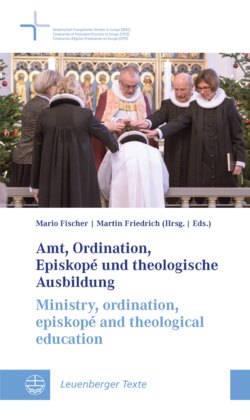Читать книгу Amt, Ordination, Episkopé und theologische Ausbildung / Ministry, ordination, episkopé and theological education - Группа авторов - Страница 27
На сайте Литреса книга снята с продажи.
2.2.5Diverse structures of ministries in the churches
Оглавление53. Christian churches are generally agreed that the church has been guided through its history by the Holy Spirit. In the view of Protestant churches this has not happened in such a way that any current structure of ministry can be regarded as unchangeable. However, the patterns of ministry are not an arbitrary matter. The shape and order of the church must always be measured against the biblical witness and the theological understanding of the church and its mission.40
54. As the churches of CPCE seek “to promote the ecumenical fellowship of all Christian churches” (LA 46), they are challenged by existing differences regarding their ministries. In order to realise church fellowship in witness and service (LA 35–36), they will strive towards the greatest possible correspondence among each other and with other traditions in their understanding and patterns of ministry.
55. A particular ecumenical issue is how the ministry of word and sacraments is understood and ordered in its relation to other services. Whereas the existence of a ministry serving word and sacraments is not an issue of choice for the churches, this ministry may be structured and exercised in diverse forms. There is broad agreement that no single and uniform church order and structure of ministry can be compellingly derived from the earliest Christian tradition.41 In general, Protestant churches maintain the legitimacy of diversity in questions of church order.
56. No ministerial structure can be directly derived from the New Testament. Even “the threefold ministry of bishop, presbyter and deacon”, recommended by BEM “as an expression of the unity we seek and also as a means for achieving it” (no. 22) has undergone various historical changes.42 Therefore the Protestant churches consider that there can be legitimate diversity among the churches on this issue. The Calvinist Reformation introduced a fourfold structure of ministry (pastors, teachers, elders and deacons) which is still valid in many Reformed churches in a modified form.43 The Nordic and Baltic Lutheran churches, which (except for Latvia) have joined the Porvoo Communion, have moved towards a positive appraisal of the threefold ministry, affirming the statement of BEM mentioned above (Ministry, no. 22). Even if the majority of these churches have not stated for themselves a threefold ministry, they consider the services of bishop, pastor and deacon as central, or indispensable, ministries in church.
57. This issue raises other questions among the Protestant churches regarding the relation of ordination to certain ministries, and the understanding of the unity of the order of ministries. This diversity does not, however, break church fellowship among the churches of CPCE. It does however make it difficult to draw practical consequences from the mutual recognition of ordinations as proclaimed in Leuenberg Agreement no. 33. Obviously, an interchangeability of ministers requires that they are equivalent in terms of theological understanding, training and the range of functions of ministry. This means that mutual recognition of ordinations according to LA 33 refers only to that ministry which is conferred by ordination in all churches of CPCE, which is the ministry of word and sacraments. The churches which practise ordination of elders should be encouraged to consider how they can relate their understanding of ordination to the meaning of ordination as referring to the ministry of word and sacraments, which all other churches of CPCE (and others far beyond) recognise.44
